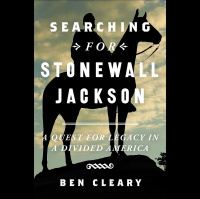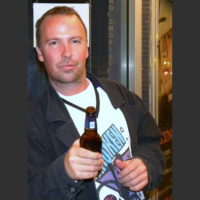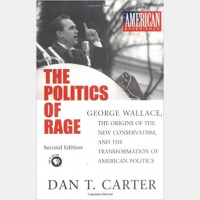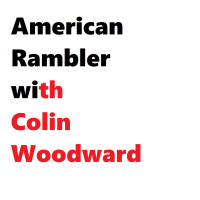American Rambler With Colin Woodward
- Author: Vários
- Narrator: Vários
- Publisher: Podcast
- Duration: 260:41:19
- More information
Informações:
Synopsis
Based in Richmond, Virginia, American Rambler discusses history, music, film, politics, and pop culture. The show is hosted by Colin Woodward, a historian, writer, and archivist. He is the author of Marching Masters: Slavery, Race, and the Confederate Army during the Civil War. He is revising a book on Johnny Cash.
Episodes
-
Episode 157: Ben Cleary
06/12/2019 Duration: 01h18minVirginia native Ben Cleary is the author of Searching for Stonewall Jackson, a non-traditional military history of one of the Civil War's most famous generals. As Ben tells Colin, his interest in "Old Jack" stems from how different the general seems to modern students of the war. Ben's book builds on a career spent writing and teaching. He began his work on Jackson after writing articles for the New York Times "Disunion" feature during the Civil War sesquicentennial. He is also a veteran of the Richmond writing scene and has taught at public schools in the area and in the juvenile justice system. Ben and Colin discuss Jackson's campaigns as well as the general's thoughts on slavery, religion, and family life. Ben talks, too, about his early writing career in the "Scarytown" era of Richmond and how he learned Russian literature from a chain-smoking countess at VCU.
-
Episode 156: Notes on Stand Up Comedy
01/12/2019 Duration: 26minRecorded earlier in the fall, Colin talks about his love of stand up comedy as well as his recent trips to the Funny Bone in Richmond, where he saw T. J. Miller and Doug Stanhope. In the intro, the Rambler examines how there's no great way to travel from Virginia to Massachusetts by car. Hope you've digested all the turkey by now! And hey, check out my blog post on Massachusetts comedy: https://americanramblerpodcast.wordpress.com/2015/08/13/the-funniest-place-on-earth-massachusetts-and-the-modern-comedy-scene/
-
Episode 155: Dan T. Carter
24/11/2019 Duration: 01h28minDan Carter is one of the best historians of the South. A native of South Carolina, he won the Bancroft Prize for his first book, Scottsboro: A Tragedy of the American South, which was published in 1969. Since then, he has written about the Reconstruction period, before turning his attention to 20th century politics in The Politics of Rage: The Origins of the New Conservatism and the Transformation of Politics (1995) and From George Wallace to Newt Gingrich: Race in the Conservative Counterrevolution, 1963-1994 (1999). Retired from teaching, he lives in western North Carolina, where he is writing about the white supremacist, faux Native American, and Hollywood screenwriter, Forrest Carter. Colin and Dan talk about southern politics; the realignment of parties in the late-20th century; the persistence of Lost Cause ideology; and worrisome nature of the Trump era.
-
Episode 154: The November Music Show!
16/11/2019 Duration: 54minAmerican Rambler talks some music, including an overview of his vinyl collection, hitting on bands and solo artists in the H-J range. Ginger Baker makes an appearance from beyond the grave. Colin gives a few thoughts on the new Wilco record. And everyone should know about Adam Faucett.
-
Episode 153: Trae Wisecarver
06/11/2019 Duration: 01h09minTrae Wisecarver is the "Outlaw Historian," and he's not messing around. A native of southern Arkansas, he's working on his Ph.D in history at Texas A & M University, where he is writing about the Civil War in his home state. Trae became a Twitter sensation in 2019. He took a cue from Keri Leigh Merritt and posted a video about the need for a new Civil War documentary that improves upon Ken Burns's 1990 film. Not one to shy away from a fight, Trae has run afoul of the dubious character Dinesh D'Souza as well as online Nazis, neo-Confederates, and other unsavory characters. Trae keeps up a spirited Twitter account, and after his original feed was suspended, he is back (and more fired up than ever.) In addition to his interview show The Outlaw Historian, you can also catch his wrestling podcast, The Oh My Godcast: An ECW Retrospective, which he co-hosts with his friend Ben Dangerously.
-
Episode 152: Brent J. Steele, Part II
04/11/2019 Duration: 48minIn part two of Colin's talk with Brent J. Steele, Brent discusses his newest book, Restraint in International Politics, which is available from Cambridge University Press. And with several decades of college life between them, Colin and Brent talk about striking a good balance between work and life. How do you get scholarship done while also being a responsible family person? What changes will you have to make in your creative process? Are your days of third-shift writing over? Probably, but there are other ways of being productive. In the intro, Colin talks about the World Series and how the Nat's were the team of destiny for reasons involving baby sharks, dancing, and Donald Trump.
-
Episode 151: Brent Steele, Part I
27/10/2019 Duration: 01h24minBrent J. Steele is the head of the political science department at the University of Utah. As he tells Colin, it was an intro to American politics his freshman year at college that made him want to become a college professor. A native of Iowa, he also got his Ph.D. there. As an academic, he has a long list of publications that weave together analysis of American politics with ideas based in Kierkegaard, Heidegger, and modern psychology. Brent stays busy. He has a book coming out soon from Cambridge University Press, Restraint and International Politics. He is also the host of his own podcast The Hayseed Scholar, which may or may not contain beer drinking. Colin and Brent cover a lot of ground concerning foreign policy and the political shifts in the period from Vietnam to the Trump and Twitter age.
-
Episode 149: John Sacher
12/10/2019 Duration: 01h11minJohn Sacher is the head of the history department at the University of Central Florida in Orlando. He is also the author of A Perfect War of Politics: Parties, Politicians, and Democracy in Louisiana, 1824-1861. John has been on a steady career path, but as he tells Colin, he had his doubts about staying in the history game while he was in grad school. John attended Notre Dame as an undergraduate. As much as he loved it there, he went to LSU for grad school. In Baton Rouge, he studied with William J. Cooper (a previous podcast guest). John completed a master's thesis and dissertation on Louisiana politics, which became the basis of his first book. After spending some years in Kansas, he is back in his home state of Florida. Now, he is finishing a book on conscription in the Confederacy, the first full-length scholarly book on the subject in many decades. As John and Colin discuss, even for the most committed students, graduate school can be daunting. Also challenging is the move from scholar to administrator
-
Episode 148: Matt Hulbert
24/09/2019 Duration: 01h21minMatt Hulbert was "born in the shadow of Stone Mountain," but it wasn't until much later in life that he knew the place's controversial history. By then, he was well on his way to becoming a Civil War historian. First, though, he had to lay aside his dream of becoming a cowboy. Matt completed his doctorate at the University of Georgia, where he studied with John Inscoe. His dissertation won the C. Vann Woodward Prize. A year later, it was published as The Ghosts of Guerrilla Memory and won the Wiley-Silver Prize for best first book. He is now working on a biography of Virginia editor turned Missourian John Newman Edwards. Matt and Colin talk about the eastern vs. western theaters as well as the violence that characterized both. Also, a certain recent article on the Civil War and the merits of social media came up. This is by far the best podcast recorded this year in a basement office at Hampden-Sydney College. And they raise the question: who would you rather have dinner with, Nathan Bedford Forrest or Robert
-
Episode 146: James Morrow
03/09/2019 Duration: 01h32minA self-described blasphemer and bewildered pilgrim, writer and novelist James Morrow was doing long-form fiction at age seven. But it was a high school literature class in his native Abington, Pennsylvania, that changed his life. There, he read greats such as Dostoevsky, Flaubert, and Camus. He went on to study at Penn and Harvard. After dabbling in film-making, he began publishing novels in the early 1980s. In such books as Blameless in Abaddon. The Last Witchfinder, and Shambling towards Hiroshima, Jim's fiction has made religion and history central themes, while incorporating elements of sci-fi and fantasy. He has also taken a Vonnegut-style approach to lampooning the absurdities of capitalism, mass media, politics, and modern American life. His latest novel is Lazarus is Waiting, which he is hoping to get published soon. A disciple of Jonathan Swift, and a man who had the good fortune to take a class with Joseph Heller, Jim's work has woven together philosophy and satire while taking on subjects dealing w
-
Episode 145: Aaron Sheehan-Dean
25/08/2019 Duration: 01h33minOriginally from Michigan, Aaron Sheehan-Dean now makes his home in Baton Rouge, where he is a professor of Civil War history at Louisiana State University. An undergraduate at Northwestern, he went on to do his master's and doctoral degree at the University of Virginia. A proud member of the "UVA Mafia," he worked with Michael Holt and Gary Gallagher (both of whom are previous podcast guests) in Charlottesville. He taught in Florida and West Virginia before moving to LSU, where he has Charles Royster's old job. Aaron is the author of Why Confederates Fought and The Calculus of Violence, the latter of which won the Jefferson Davis Award from the American Civil War Museum in 2018. But as Aaron tells Colin, he originally wanted to be in politics. Working in Congress for a few years, he saw the growth of partisan rancor. He also developed his speaking chops and realized he wanted to pursue history as a career. At UVA, he discovered that grad school isn't just for single people: he managed to finish school and rai
-
Episode 144: Stephanie McCurry
04/08/2019 Duration: 01h27minA native of Northern Ireland, Stephanie McCurry moved to Canada while in high school before settling in the United States. She studied under renowned slavery scholars Eugene and Elizabeth Fox Genovese as a grad student. She made a big splash with her first, prize-winning book, Masters of Small Worlds, which wove together politics, gender, and class relations in antebellum South Carolina. Her second book, Confederate Reckoning, published in 2010, was a finalist for the Pulitzer Prize. Now she has a new book, Women's War: Fighting and Surviving the American Civil War. Despite her success, Dr. McCurry is honest about the challenges she has faced. She talks about her rough road to settling in America, the often thorny nature of grad school politics, and producing scholarship amid changing jobs, moving across the country, and raising children. Through it all, she has focused on the role of women in 19th century American history and how she has tried to raise (and answer) new questions about the past.
-
Episode 142: Frank Kirkpatrick
27/07/2019 Duration: 01h29minFrank Kirkpatrick is a theologian and former religion professor at Trinity College, where he taught for 47 years. He was also Colin's advisor, overseeing his thesis on Soren Kierkergaard. Frank's class on major religious writers made Colin want to be a double major in religion and history as an undergraduate. Now, more than 20 years later, they talk about some major figures in American and European philosophy and how the United States is becoming a more secular country. It's an episode that takes on everything from Paul Tillich to Reinhold Niebuhr.
-
Episode 141: Jim Stramel
30/06/2019 Duration: 01h16minOriginally from Iowa, Jim Stramel is a longtime resident of Richmond. As a college student in Florida, he hopped in a van bound for Virginia and hasn't looked back. Jim started making films on 16mm, work that culminated in his first full-length movie Thrillbillys (2001). Since then, Jim has moved on to making horror films, such as Degenerates Ink. His latest work is the webseries Reviled, which explores the dark world of zombie pit fighting. Over a couple of beers, Colin talks with Jim about how he got his start making films, his influences, "Old" Richmond, and why he likes working with musicians. Hopefully after this conversation, Sony will be calling soon!
-
Episode 140: Court Carney and Mad Men
13/06/2019 Duration: 01h20minCourt Carney, a professor at Stephen F. Austin University, returns to the podcast to talk about a course he recently taught on the late, great AMC show Mad Men. As Court makes clear, the show is a rich text that tells us a lot about 1960s history. Mad Men first garnered attention for its stark portrayal of gender roles, but the series became iconic for its modernist look, sharp writing, morally and psychologically complex characters, and intricate plot lines. And because you can't have a conversation with Court without talking about music, Dr. Carney examines how the Mad Men soundtrack--using everything from the Beatles to Sergio Mendes--heightened the drama. Also, Colin and Court talk about 1980s synth pop and the memoir by Wilco front man Jeff Tweedy.
-
Episode 139: Scott Reynolds Nelson
07/06/2019 Duration: 01h35minA professor at the University of Georgia, Scott Reynolds Nelson is the author of several books and recently was awarded a Guggenheim fellowship. But as he tells Colin, he was not interested in history as a young man enamored with comic books and computers. Still, history proved a much safer path than the one he was pursuing, one which might have ended him up in jail. In his work, Scott has combined economic history, social studies, and folklore. He is perhaps best known for his book on John Henry, which became the basis for not only a children's book but a musical. As he tells Colin, Steel Drivin' Man started as a mid-life crisis and middle finger to the profession. By breaking all the "rules," he had great success. Scott also talks about his books on the Civil War, how wheat led to the collapse of monarchs in Europe, and why his work on the panic of 1873 made him very popular during the depression of 2008-2009. On this episode, we cover everything from cyberpunk to the birth of rock and roll!
-
Episode 138: Michael F. Holt
31/05/2019 Duration: 01h31minRetired historian Michael Holt is one of the most accomplished writers on antebellum politics. A professor at the University of Virginia for decades, he is perhaps best known for his grand 1999 book, The Rise and Fall of the American Whig Party. He is also the author of The Political Crisis of the 1850s, The Election of 1860, and other books. His most recent, and last (he tells us) is about president, soldier, hard drinker, and empath Franklin Pierce. A native of Pittsburgh, Michael talks about his days as a self-professed "punching bag" for the imposing David Donald at Johns Hopkins. From there, he discusses his days on the road doing research, his take on the race issue in the 1850s, and comparing the antebellum era with today's politics. And why should we care about Franklin Pierce? Find out in this conversation from Charlottesville!
-
Episode 137: Mark Thompson, Part II
19/05/2019 Duration: 01h15sIn part two of his conversation with Mark Thompson, Colin talks about Mark's move to the Netherlands, what he teaches there, and comparison between Dutch and American living. Is college in the Netherlands really free? Is it better? And what does Mark miss and not miss about the States? Things get political, but in a respectful kind of way. That said, Colin might be ready to board a plane for Groningen at any minute. Look out, Mark! Look out, Holland!
-
Episode 136: Mark Thompson, Part I
11/05/2019 Duration: 01h02minMark Thompson is a historian of colonial America and a professor at the University of Groningen in the Netherlands. A native of New Orleans, he studied under Jack Greene at Johns Hopkins University before moving to Baton Rouge. He and Colin met at LSU, where Mark was teaching and Colin was a graduate student. They talk about Mark's path to becoming a historian, surviving Louisiana, and his book The Contest for the Delaware Valley: Allegiance, Identity, and Empire in the Seventeenth Century (LSU Press, 2013). What was the story of the Dutch in the New World? Did they really buy Manhattan for $24? And how might their story affect how we think of the development of early American history?
-
Episode 135: Professor Buzzkill
22/04/2019 Duration: 01h18minDr. Joseph Coohill is the host of the popular history podcast Professor Buzzkill. Trained as a historian of 19th English politics, Joe's penchant for "busting myths" began in the classroom. Now, it serves as the basis for his weekly show, where he covers everything from Chinese feminists and the Pearl Harbor attacks to Jesse James and Richard Nixon. Joe talks about how he got started on the mic, some early lessons he learned, and how the show has become part of an international podcasting network. What are the differences between historical myths and conspiracy theories? How have movies such as Patton,The Imitation Game, and The Bridge on the River Kwai affected our historical consciousness? And did Mussolini really make the trains run on time? Also, Colin takes advantage of Joe's expertise in English history to talk about the historic mess that is Brexit. Interested in doing a history (or any) podcast? Joe is here to help!



















